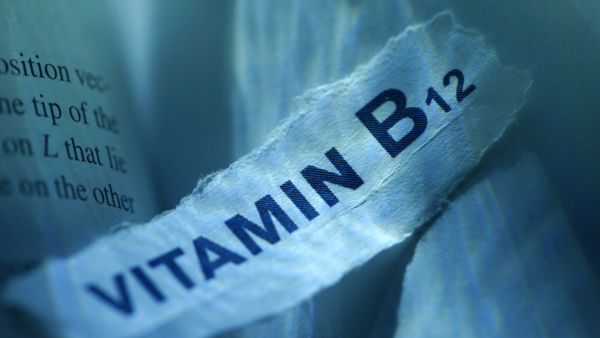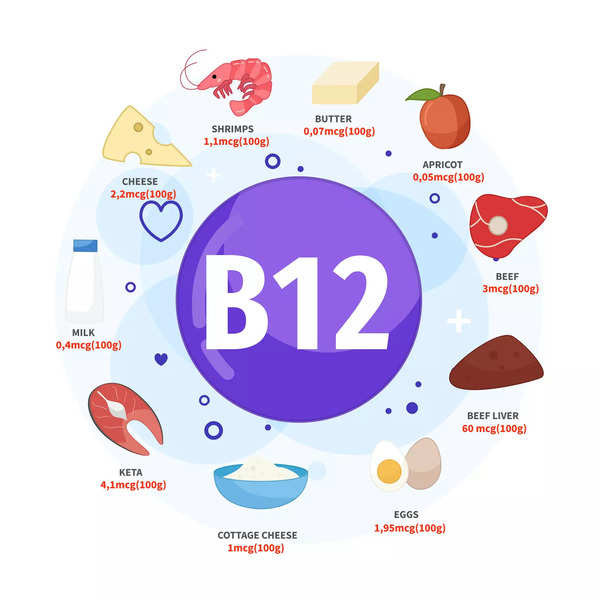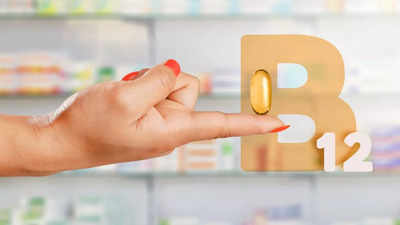Vitamin B12, also known as cobalamin, is full of nutrients that play an important role in our body’s overall functioning. It keeps our brain sharp, gives us energy, supports red blood cell production, and even helps maintain healthy nerves. Yet, despite its importance, many people unknowingly suffer from a deficiency. The symptoms can be sneaky, and if left untreated, the deficiency can lead to serious health issues.
This is the ultimate guide to everything about vitamin B12—its benefits, sources, daily requirements, and what happens when our body doesn’t get enough.

What does vitamin B12 do for our body?
Vitamin B12 is an essential nutrient, meaning our body can’t produce it on its own—we have to get it from food or supplements. Here’s why it’s so important:
Boosts energy levels: B12 helps convert the food you eat into glucose, which provides energy. That’s why a deficiency can leave you feeling exhausted.
Supports brain function: It plays a key role in memory, focus, and overall cognitive function. Low B12 levels have been linked to memory problems and even early dementia.
Helps in red blood cell formation: B12 helps produce healthy red blood cells, preventing anemia and keeping oxygen flowing through your body.
Protects nerve health: It helps maintain the protective covering around your nerves, preventing issues like tingling, numbness, or nerve damage.
Good for the heart: B12 helps regulate homocysteine levels, an amino acid linked to heart disease.
Important for mood and mental health: B12 is crucial for producing serotonin, a neurotransmitter that regulates mood. Deficiency can lead to depression and anxiety.
Signs and symptoms of vitamin B12 deficiency
Vitamin B12 deficiency doesn’t happen overnight—it creeps up slowly, often making it hard to detect. Here are some common signs that you might be running low on B12:
Constant fatigue and weakness
If you’re always feeling drained, even after a full night’s sleep, it could be due to low B12 levels. Your body needs B12 to produce energy, and without it, you may feel sluggish all the time.

Numbness and tingling in hands and feet
B12 plays a big role in nerve function. A deficiency can cause a tingling, pins-and-needles sensation in your limbs.
Memory problems and brain fog
Struggling to concentrate? Forgetting things more often? Low B12 levels can lead to cognitive issues and even increase the risk of dementia.
Pale or jaundiced skin
A lack of B12 affects red blood cell production, which can lead to paleness or a slight yellowish tint to your skin.

Shortness of breath and dizziness
Since B12 is needed for red blood cell production, a deficiency can cause anemia, leading to dizziness and breathlessness.
Mood swings and depression
If you’re feeling low for no apparent reason, low B12 might be affecting your serotonin levels.
Who is most at risk of vitamin B12 deficiency?
While anyone can develop a B12 deficiency, some people are at a higher risk:
Vegans and vegetarians: Since B12 is primarily found in animal products, those following a plant-based diet need to find alternative sources.

Older adults: As we age, our bodies absorb B12 less efficiently.
People with digestive disorders: Conditions like Crohn’s disease, celiac disease, and IBS can interfere with B12 absorption.
Pregnant and breastfeeding women: They need more B12 for both themselves and their baby.
Individuals on certain medications: Some medications, like antacids and diabetes drugs (metformin), can reduce B12 absorption.
Best food sources of vitamin B12

Image: iStock
If you want to up your B12 intake naturally, here are some of the best food sources:
Animal-based sources:
- Fish
- Eggs
- Dairy products (milk, cheese)
- Chicken
Plant-based and fortified sources:
- Fortified cereals
- Nutritional yeast
- Fortified plant-based milk (almond, soy, oat milk)
- Mushrooms (certain varieties like shiitake)

How much vitamin B12 do you need daily?
The Recommended Dietary Allowance (RDA) for vitamin B12 varies by age:
- Adults: 2.4 mcg per day
- Pregnant women: 2.6 mcg per day
- Breastfeeding women: 2.8 mcg per day
- For those who are deficient, doctors may recommend higher doses through supplements or injections.
Vitamin B12 is produced by certain microorganisms, that live in the gut microbiome of animals and humans. Here are some examples of microbiome-producing vitamin B12:Lactobacillus species ,Some species of Bifidobacterium species like B. bifidum and B. breve, Pseudomonas aeruginosa, a bacterium commonly found in soil and water,Streptomyces griseus, is a bacterium used in antibiotic production, is also a vitamin B12 producer.Methanobrevibacter ruminantium, an archaeon found in the rumen of cattleSaccharomyces cerevisiae, a yeast used in baking and brewing Human gut microbiome can produce vitamin B12, particularly in the large intestine. However, the amount produced may not be sufficient to meet daily requirements and has variable bioavailability. Also a diverse gut microbiome is needed which is a product of healthy diet.
Sweedal Trinidade, Chief Dietician, P.D. Hinduja Hospital and MRC, Mumbai
How to fix a vitamin B12 deficiency
If you’re diagnosed with a deficiency, don’t worry—there are ways to fix it:
Eat more B12-rich foods
If your deficiency is mild, simply increasing your intake of B12-rich foods might be enough.
Take B12 supplements
B12 supplements are widely available in tablet, capsule, and liquid forms. They are especially useful for vegans, vegetarians, and older adults.
Get B12 injections
For severe deficiencies, doctors may recommend B12 injections, which go directly into the bloodstream for better absorption.
Use fortified foods
Many cereals, plant-based milks, and nutritional yeast products are fortified with B12 and can help maintain adequate levels.


